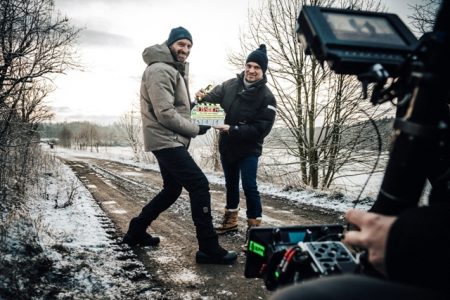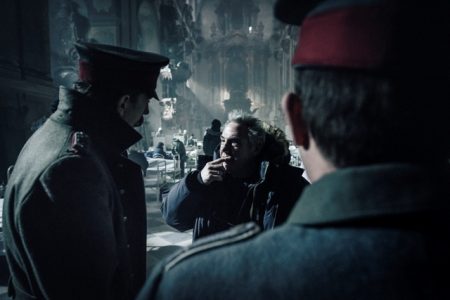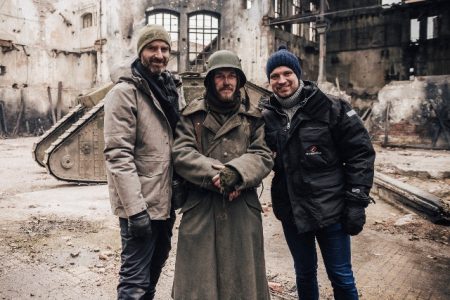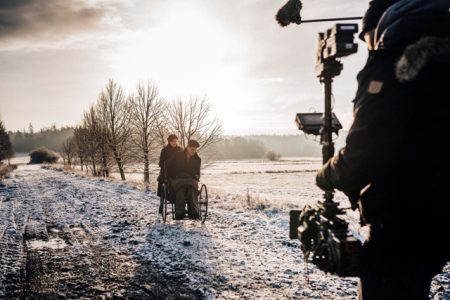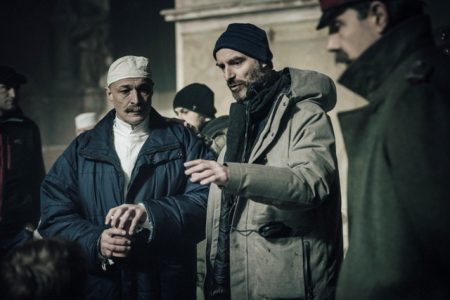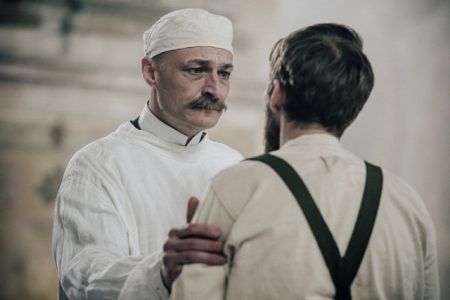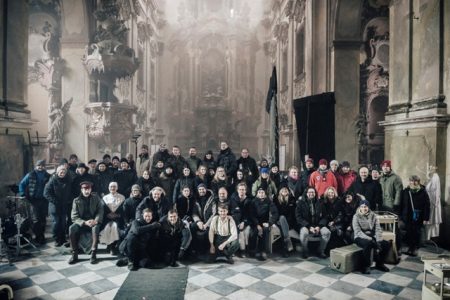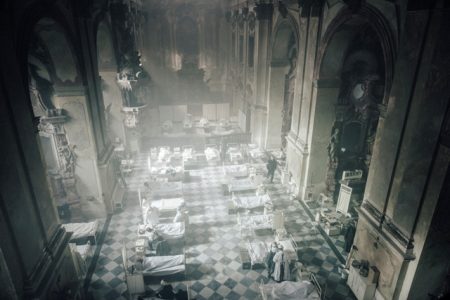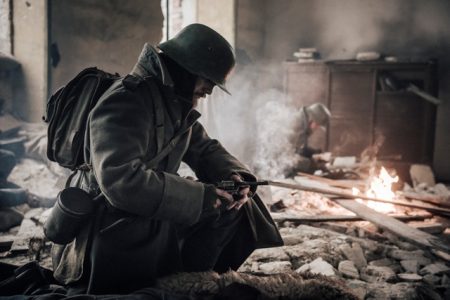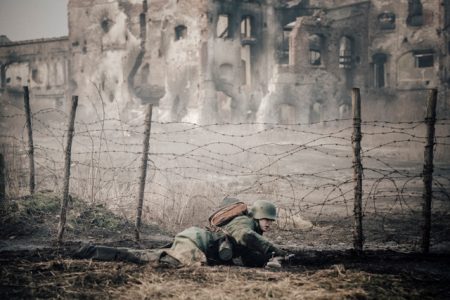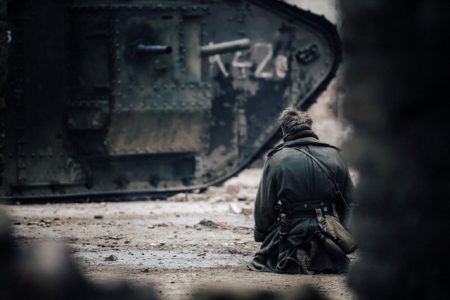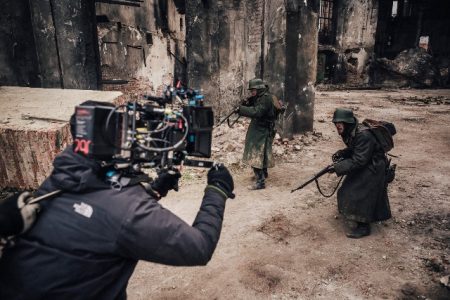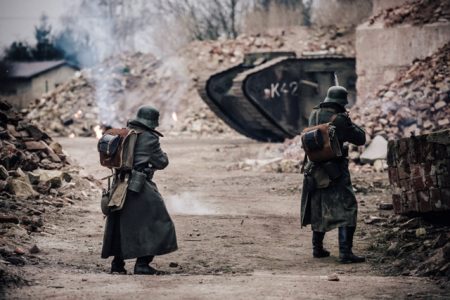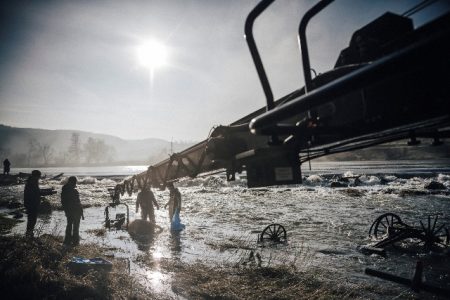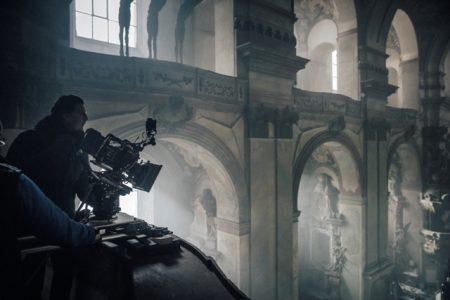Denmark, Germany, and the Czech Republic are putting together a timely gift to mark the 100th anniversary of the end of World War I in November. Together they’re making a film bearing the working title In War and Love (I Krig & Kærlighed), which takes place against the background of the Great War. The first part of filming has just finished in the Czech Republic, from where the crew will relocate to Denmark and Germany.
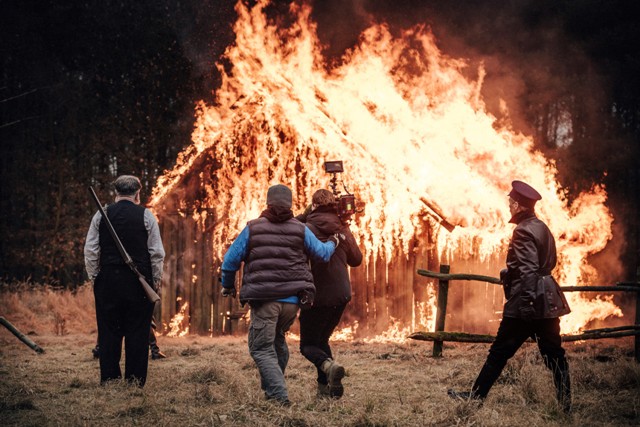
© Fridthjof Film / Film United. Photo by Stanislav Honzik
It’s Sunday, February 11, ten o’clock in the morning. An icy mist rolls over the central Bohemian village of Jeviněves, and despite the fact that the thermometer reads just below zero, there’s no snow in sight. “We couldn’t ask for better weather,” says Danish producer Ronnie Fridthjof. “We’re about to film a burning barn in which our main character fakes his death. It’s March 1918.”
The wooden barn is situated on a large clearing in the middle of the woods and looks as if it’s stood there since the war. “It’s just a set construction, of course. The scene takes place in Denmark, so the director wanted a mixed forest of birch trees,” explains location manager Filip Doruška.
The actual blaze is preceded by several carefully orchestrated tests. “It’s a key scene – the main characters ride up to the barn on horseback. We’re setting an actual fire, so we’ve only got a single chance to film the burning barn before it collapses,” says Fridthjof with a smile. He’s got a good reason to feel satisfied. The producer can’t speak highly enough of the Czech crew. “We’ve got a mixed crew that we’ve been using for the entire film in all three countries. It wasn’t that in Denmark we use only Danes and in Germany only Germans. Most of the crew are Czechs that have gone with us to all the locations.”
Line Producer Veronika Lencová gratefully acknowledges the praise: “It’s truly a unique co-production project – we can be proud of the fact that the producers are taking the Czech crew along to Denmark and Germany. They’re only filming for a week here in the Czech Republic, but they’re spending CZK 30 million during that short period, which isn’t a small sum.”
The film tells the tragic story of Dane Esben, who manages a mill with his wife Kirstin on the island of Ais, occupied for 50 years by the Germans. Esben enlists and after the bloody battle of Verdun he is discharged for health reasons. During his absence, Kirstin becomes the target of German officer Gerhard’s attentions. Esben’s return from the war is not to Gerhard’s liking, and he wants to get him back to the front lines. To save himself, Esben fakes his death and hides in the attic of his own house but must suffer Gerhard’s courtship of his wife in silence.
“Although the film takes place in Denmark, the theme is international,” says producer Rick McCallum of the Czech company Film United. “The profound, moving story of this love affair shows people acting under the great pressures of war, as well how they behave later, once they return home. Those events affected all of Europe, as well as the United States,” explains McCallum thoughtfully.
Danish producer and script co-writer Ronnie Fridthjof adds: “When we wrote the script, we hit upon a thorny issue. Who’s the real enemy here? Why do we mistreat each other? How can a person be capable of committing crimes against another human? Why do we even kill each other? It’s because the “illusion of enemy” deceives us. By definition, the idea of an “enemy” is nonsense. They’re only human, and in the end, it’s all about how we treat each other.”
Tom Wlaschiha, who plays the German officer Gerhard, is the embodiment of this invisible conflict between external good and internal evil. At first glance, his pleasant demeanor seems to dispel any doubts, but Wlaschiha embraces his role as the wartime enemy with vigor. When asked how this character compares to that of Jaqen in Game of Thrones, he answered: “What I love about acting is that I have the opportunity to experience different historical periods than the present in which we live. What’s more, in this case, I’m acting in the Czech Republic, where I’ve spent so much time lately that I might as well move here,” he smiles, alluding to his role in the series Das Boot, which was wrapped in Prague just a few weeks ago.
Danish actor Thure Lindhardt also plays in the film, known for his roles in Angels and Demons and Into the Wild. The film also draws him to philosophize: “Freedom and peace are such fragile things. There’s such a fine line between peace and war! The first world war started with only a single bullet with which Gavrilo Princip shot the nephew of Franz Josef I. We should never take peace for granted – it’s something that we should carefully tend every day.”
It’s coming up on four in the afternoon, and the sun is slowly setting. The scene, which lasts for just under a minute in the film, is carefully rehearsed. Two cameras and a crew of 130, who have been on their feet since the wee hours of the morning, are ready to capture the burning barn on film. Two fire trucks stand by – the special effects team counts down the seconds to the moment of ignition. The tension mounts…but we’ll have to wait until the November premiere to see how the scene turns out.
By Pavlina Zipkova
